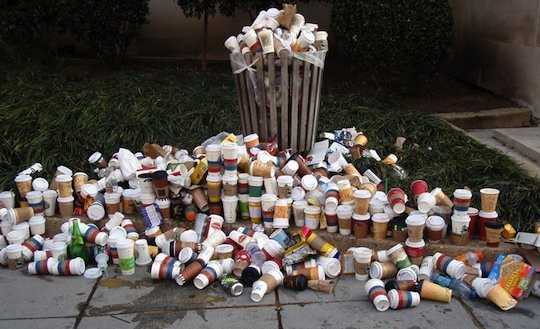LONDON, UK — The UK is set to throwaway a third more takeaway drinks cups by 2030, as the overall amount of plastic waste the country produces surges by 20 percent, according to new research published by WWF on the day of Earth Hour.
It also shows UK consumers are the second biggest users per person of single-use drinks cups, straws, food containers, crisp packets and wet wipes.
As a record 400 UK landmarks turn off their lights between 8:30 and 9:30 pm tonight in support of Earth Hour, the world’s largest event in support of the planet, WWF says the alarming figures show the need for urgent action to reduce single-use plastic waste.
The conservation organisation calls on UK governments to implement concrete policies such as a “latte levy” – a charge on disposable drinks cups – and a deposit return scheme for plastic drinks bottles to combat this rising tide of plastic waste. Ultimately, WWF would like to see an end to avoidable single-use plastic in the UK by 2025.
This Earth Hour, WWF is also asking the UK public to make a #PromiseForThePlanet, a pledge to make one change in their own lives to reduce their environmental footprint such as refusing plastic cutlery or carrying a reusable coffee cup. The promises have been chosen as examples of small behaviour changes people can make that collectively will have a big impact.
The new figures on plastic use are based on modelling of existing available data and take into factors such as rising GDP and the impact of new European legislation. They show that without urgent new action, the amount of plastic waste produced by the UK will rise from 5.2 million tons this year to 6.3 million in 2030 – an increase of 20 percent in just 12 years.
The majority of this waste – 67 percent – is from packaging, a far higher proportion than the rest of the EU. This is due in part to more people in the UK buying convenience foods, such as take-away meals or prepared foods.
The report forecasts that by 2030, the UK will use:
- 41% more plastic straws
- 33% more cups and lids
- 34% more crisp packets
- 9% more drinks bottles
Use of a few common items made using single-use plastic is estimated to fall, with cigarette filter waste falling by 50% and the number of cotton buds set to decrease by 69% as alternatives become more widely adopted.
Tanya Steele, CEO of WWF commented: ““We are polluting our world with plastic, suffocating our oceans and overwhelming our wildlife. The amount of plastic which the UK is throwing away is set to rocket by over a million tonnes by 2030 – that’s the equivalent of 87,000 more double decker buses worth of plastic waste each year. We must act now – banning avoidable single use plastic by 2025 – and introducing incentives to help people and businesses make the right choices to reduce, reuse and recycle. This Earth Hour, millions of people around the UK are sending a powerful message that we must act now on climate change and pollution to save our planet.”
Ranking the UK against other European Union countries, the research for WWF also found the UK was one of the biggest per capita users of key single-use plastic products. UK consumers each use more cotton buds and sanitary towels than any other EU nation, and are the second largest consumers of wet wipes, plastic cutlery, straws, stirrers, drinks cups and food containers. This year, the UK will use 10.8 billion wet wipes, 16.5 billion pieces of plastic cutlery, 42 billion straws, 44 billion stirrers, 4.1 billion single-use drinks cups and lids, and 5.2 billion plastic food containers.
The report also shows that while plastic waste will rise dramatically if action isn’t taken, recycling is likely to increase more slowly. Currently, only 31% of total plastic waste is recycled, but this is projected to increase 12 percent to 42% by 2030 as a result of lifestyle changes and future policies taking effect.
However, the amount of recycled single-used plastic – much of which is difficult to recycle – will rise just 8 percent, from 29 percent to 37 percent over the same period. This takes into account increases in plastic bottle recycling as a result of the new EU Packaging and Packaging Waste Directive. The remaining plastic waste will likely head to landfills or be incinerated.


















